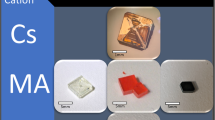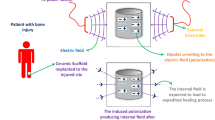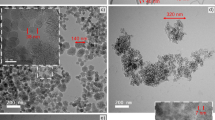Abstract
Bassett and Becker1 and Shamas and Lavirie2 have demonstrated that electric potentials occur when specimens of bone are subjected to mechanical stress. Shamas and Lavine have indicated that these effects can be explained in terms of classical piezo-electricity, and not a semiconductor mechanism as suggested by Bassett and Becker; part of the argument against the semiconductor mechanism concerns the dependence of resistivity on temperature.
This is a preview of subscription content, access via your institution
Access options
Subscribe to this journal
Receive 51 print issues and online access
$199.00 per year
only $3.90 per issue
Buy this article
- Purchase on Springer Link
- Instant access to full article PDF
Prices may be subject to local taxes which are calculated during checkout
Similar content being viewed by others
References
Bassett, C. A. L., and Becker, R. O., Science, 137, 1063 (1962).
Shamas, M. H., and Lavine, L. S., Clin. Orthopaed., 35, 177 (1964).
Fukada, E., and Yasuda, I., J. Phys. Soc. Jap., 12, 1158 (1957).
Fukuda, E., and Yasuda, I., Jap. J. Appl. Phys., 3, No. 2, 117 (1964).
Author information
Authors and Affiliations
Rights and permissions
About this article
Cite this article
BRADEN, M., BAIRSTOW, A., BEIDER, I. et al. Electrical and Piezo-electrical Properties of Dental Hard Tissues. Nature 212, 1565–1566 (1966). https://doi.org/10.1038/2121565a0
Published:
Issue Date:
DOI: https://doi.org/10.1038/2121565a0
This article is cited by
-
Co-doping of ions on structural, mechanical, dielectric, and surface analysis on hydroxyapatite composites
Journal of the Australian Ceramic Society (2021)
-
Phase behavior and chain dynamics of elastin-like peptides versus amino acid sequences
Journal of Thermal Analysis and Calorimetry (2018)
-
Fabrication and in vitro biological properties of piezoelectric bioceramics for bone regeneration
Scientific Reports (2017)
-
The effect of electric current on rat tail tendon collagen in solution
Calcified Tissue Research (1969)
-
Biologic significance of piezoelectricity
Calcified Tissue Research (1967)
Comments
By submitting a comment you agree to abide by our Terms and Community Guidelines. If you find something abusive or that does not comply with our terms or guidelines please flag it as inappropriate.



